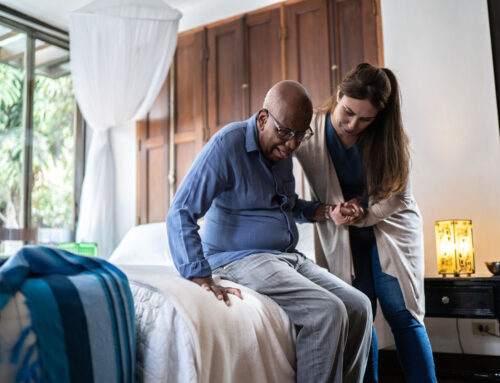Coping with an Alzheimer’s diagnosis can feel overwhelming and life shattering. This devastating disease carries with it tremendous fear and uncertainty. Many people will know someone affected by Alzheimer’s (according to the Alzheimer’s Association, more than 6 million people are living with Alzheimer’s in the United States). But few truly think it will happen to them, and when it does, it’s easy to become lost in anger, disbelief, fear and dismay. With these steps, coping with an Alzheimer’s diagnosis can be possible, and you can learn acceptance, be ready to face the challenges and move forward with your life.
Learn All You Can. Knowledge is empowering. It not only will help you prepare for challenges but it can enable you to find control where you can. Learn all you can about your Alzheimer’s diagnosis, potential medications and treatment options. According to the Alzheimer’s Association, there’s no cure for Alzheimer’s, but there are treatments that may change disease progression, and drug and non-drug options that may help treat symptoms. Understanding available options can help individuals living with the disease and their caregivers to cope with symptoms and improve quality of life.
Empower Yourself. Empower yourself through the support, strength and joy that comes from important relationships. Now is not the time to isolate yourself. Friends enrich our lives, and when you’re living with illness, they can have a tremendous positive impact on your mood and attitude. Remaining social will help you feel less isolated and alone in your struggles. Friendships are powerful in uplifting us during difficult times.
Secure Your Identity. When living with a serious illness, many people feel a loss of self. You are no longer you but have become your medical condition. Having Alzheimer’s doesn’t have to redefine who you are. Though you may feel your life changing, you are still you. Focus on living the roles that give you back yourself: sibling, spouse, grandparent, friend, writer, artist, creator, gardener, animal lover. Living fully who you are can help you feel less like your disease is taking over your life.
Practice Gratitude. A diagnosis of Alzheimer’s is so life altering that you may have trouble recognizing what is still valuable in your life. But practicing gratitude has been proven to help people deal with adversity and improve their well-being. Practicing gratitude can help you focus on what’s still good in your life.
Find Calm in the Chaos. Being diagnosed with a serious illness can bring turmoil into our lives. It can overpower our days when we live with nothing but the fear of the illness. Find what brings you a sense of calm in the chaos. Many healthcare professionals recommend meditation. Meditation can give you a sense of balance and peace, and it can promote relaxation. Meditation can seem intimidating, but there are now many apps available that can help. Spending time in nature can also have calming and destressing benefits. Find what helps bring peace and calm to your life, especially on those days when you feel overwhelmed.
Hospice can greatly improve the quality of life for a loved one with Alzheimer’s and bring support, guidance and empowerment to the family and patient’s caregivers. The Roze Room team is highly trained in providing expert care for Alzheimer’s patients and their families. Our blog, 8 Ways Hospice Can Help Families Living With Alzheimer’s, shares how the extra layer of support from hospice improves quality of life and helps reduce the burdens of Alzheimer’s.
Getting the Support You Need
Are you caring for a loved one with Alzheimer’s? Do you feel it’s time to ask for the support and care you both need? Roze Room is here to help. Our skilled Alzheimer’s professionals can help determine the level of care and support that will bring the most benefit to you and your loved one. You don’t have to face this alone. Learn more here on how we can help.





